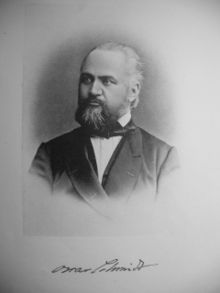Eduard Oscar Schmidt
(Eduard) Oscar Schmidt (born February 21, 1823 in Torgau , † January 17, 1886 in Kappelrodeck ) was a German zoologist .
Live and act
Schmidt was born as the son of the military preacher Adolph Eduard S. and Fani Cecilie Sophie. Ramus born. After completing high school in Schulpforte , he first studied mathematics and natural sciences in Halle from 1842 and moved to Berlin after a year . There he came to zoology through Christian Gottfried Ehrenberg and Johannes Peter Müller . In 1847 he completed his habilitation in Jena . He taught in Jena from 1848, from 1855 in Krakow , from 1857 in Graz and from 1872 in Strasbourg . Schmidt was one of the first advocates of Darwin's theory of evolution and applied it in his research areas. In doing so, he extended the application of the concept of descent to the entire area of life, from its origin to the human being. So he wrote in 1873:
- "[...] we may, yes, we must conclude that life appeared at a certain point in time of cooling in a natural way, ie without an incomprehensible act of creation, [...]"
And about the peculiarity of human language:
- “Even if one were unclear about the origin of the language or even had to admit complete ignorance about this point, one should not deduce from the existence of the language that the theory of descent is inapplicable to humans without, as it seems to us, the chain of Abandon mental operations arbitrarily. "
In 1880 he was elected a member of the German Academy of Sciences Leopoldina .
He was friends with Ernst Haeckel and Franz Unger , both of whom were doing research on the Adriatic in Italy. This inspired him to work on the sponges (Porifera) in this region. He wrote several systematic and developmental studies about this. He also made a contribution to popularizing the natural sciences. In 1866, for example, Schmidt wrote the volume of “Niedere Thiere” for Brehm's Thierleben .
Fonts (selection)
- The rhabdocoelen vortex worms (Turbellaria rhabdocoela) of the sweet water. Mauke, Jena 1848, ( digitized ).
- Pictures from the north, 1851.
- The microscope, 1851.
- Hand Atlas of Comparative Anatomy. For use in academic lectures and for students. Mauke, Jena 1852.
- Goethe's relationship to the organic natural sciences, 1853.
- Textbook of Zoology. Braumüller, Vienna 1854, ( digitized version ).
- The Development of Comparative Anatomy, 1855.
- Deliciae herpetologicae Musei Zoologici Cracoviensis, description of the undisclosed Batrachians in the KK Museum in Krakow, collected by JV Warszewitz in New Granada and Bolivia . In: Memoranda of the Imperial Academy of Sciences / Mathematical-Natural Science Class. tape 14 , 1858, p. 237-258 ( biodiversitylibrary.org ).
- Guide to Zoology, for Higher Schools, 1860 - 4th ed. 1882.
- The sponges of the Adriatic Sea. Engelmann, Leipzig 1862, (on this: Supplement 1: Contains the histology and systematic supplements. Ibid. 1864; Supplement 2: Contains the comparison of the Adriatic and British types of spongy. Ibid. 1866).
- (with Franz Unger ) The Age of Humanity and Paradise, 1866.
- Lives of crabs, worms, and undivided invertebrates. In: Ernst L. Taschenberg , Oskar Schmidt: Invertebrate Thiere (= Illustrirtes Thierleben. A general customer of the animal kingdom . Vol. 6). Bibliographisches Institut, Hildburghausen 1869, pp. 619-1031.
- Descendancy theory and Darwinism (= International Scientific Library. Vol. 2, ZDB -ID 843781-6 ). Brockhaus, Leipzig 1873, ( digitized ).
- The Mammals in their Relation to the Ancient World, 1884.
literature
- Hans-Joachim Böttcher : "Schmidt, Eduard Oscar", in: Important historical personalities of the Düben Heath, AMF - No. 237, 2012, pp. 90–91
- Wilhelm Hess : Schmidt, Oscar . In: Allgemeine Deutsche Biographie (ADB). Volume 32, Duncker & Humblot, Leipzig 1891, p. 11 f.
- Constantin von Wurzbach : Schmidt, Oscar . In: Biographisches Lexikon des Kaiserthums Oesterreich . 30th part. Kaiserlich-Königliche Hof- und Staatsdruckerei, Vienna 1875, pp. 309–312 ( digitized version ).
Web links
- Literature by and about Eduard Oscar Schmidt in the catalog of the German National Library
Individual evidence
- ^ Schmidt: Descendency theory. 1873, p. 10 .
- ^ Schmidt: Descendency theory. 1873, p. 11 .
- ↑ Member entry of Eduard Oscar Schmidt at the German Academy of Natural Scientists Leopoldina , accessed on June 21, 2016.
| personal data | |
|---|---|
| SURNAME | Schmidt, Eduard Oscar |
| ALTERNATIVE NAMES | Schmidt, Oscar |
| BRIEF DESCRIPTION | German zoologist |
| DATE OF BIRTH | February 21, 1823 |
| PLACE OF BIRTH | Torgau |
| DATE OF DEATH | January 17, 1886 |
| Place of death | Kappelrodeck |
